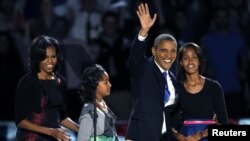An African analyst observing the U.S. elections said he was surprised by the long voter queues and logistical problems at some polling centers. Ebrahim Fakir, of the Electoral Institute for the Sustainability of Democracy in Africa, in Johannesburg, said the presidential and congressional elections always draw worldwide attention.
“I think this is true because of the way in which U.S. popular culture, U.S. politics…loom large across the world,” he said. He added that there was “massive interest” among many people outside the United States about Obama-related allegations he described as “quite silly,” including speculation about Mr. Obama’s identity, his birthplace and religious persuasion.
Fakir said, “I think many people around the world were quite surprised, in fact, shocked, at the level of debate around some of these issues.”
The many political polls used in the elections, he said, created confusion among observers.
“I think if one believed many of the opinion polls, then one was frankly quite bewildered. And so there came a point in watching this process in which one had to stop looking at the opinion polls, because there were as many outcomes predicted as there were opinion polls,” he said.
Tuesday’s long voter queues and waiting times are something not usually seen in U.S. elections. They are more common in developing countries.
“That also came as quite a surprise,” he said, “but it’s not just the long queues. What is even more disturbing were reports…many electoral officials were not [aware of] the procedures and processes. And this severely affects the way in which an election is administered and managed.”
Fakir said that while the American people trusted the election process, some may have found it frustrating and could be discouraged from voting in the future.
“It appears as if that the one place where everyone looked for efficiencies in the electoral administration and the electoral management is in fact making a slight reversal,” he said.
Fakir said he is not surprised by the sharp political divisions in the U.S.
“I’m not sure that that’s something that should be disturbing. In fact that is the nature of politics. Politics is about competition. Politics is about some level of conflict. Politics is about contestation. You’re not always going to have consensus-seeking approaches to politics,” he said.
Nevertheless, two areas where he said the president and members of congress need to reach a consensus are the economy and budget deficit.
Fakir said many people in Africa will be looking for a second Obama administration to fulfill the promises of his first term.
“Even incremental progress would be something that would be welcomed, particularly in countries of Africa, to be able to stimulate a greater amount of trade, some level of aid and to help…entrepreneurship so that there’s a greater amount of job creation and at least some level of economic growth and a modest level of redistribution of resources within these societies,” he said.
Fakir is manager of the Electoral Institute for the Sustainability of Democracy in Africa’s Political Parties Parliamentary Support Program.
“I think this is true because of the way in which U.S. popular culture, U.S. politics…loom large across the world,” he said. He added that there was “massive interest” among many people outside the United States about Obama-related allegations he described as “quite silly,” including speculation about Mr. Obama’s identity, his birthplace and religious persuasion.
Fakir said, “I think many people around the world were quite surprised, in fact, shocked, at the level of debate around some of these issues.”
The many political polls used in the elections, he said, created confusion among observers.
“I think if one believed many of the opinion polls, then one was frankly quite bewildered. And so there came a point in watching this process in which one had to stop looking at the opinion polls, because there were as many outcomes predicted as there were opinion polls,” he said.
Tuesday’s long voter queues and waiting times are something not usually seen in U.S. elections. They are more common in developing countries.
“That also came as quite a surprise,” he said, “but it’s not just the long queues. What is even more disturbing were reports…many electoral officials were not [aware of] the procedures and processes. And this severely affects the way in which an election is administered and managed.”
Fakir said that while the American people trusted the election process, some may have found it frustrating and could be discouraged from voting in the future.
“It appears as if that the one place where everyone looked for efficiencies in the electoral administration and the electoral management is in fact making a slight reversal,” he said.
Fakir said he is not surprised by the sharp political divisions in the U.S.
“I’m not sure that that’s something that should be disturbing. In fact that is the nature of politics. Politics is about competition. Politics is about some level of conflict. Politics is about contestation. You’re not always going to have consensus-seeking approaches to politics,” he said.
Nevertheless, two areas where he said the president and members of congress need to reach a consensus are the economy and budget deficit.
Fakir said many people in Africa will be looking for a second Obama administration to fulfill the promises of his first term.
“Even incremental progress would be something that would be welcomed, particularly in countries of Africa, to be able to stimulate a greater amount of trade, some level of aid and to help…entrepreneurship so that there’s a greater amount of job creation and at least some level of economic growth and a modest level of redistribution of resources within these societies,” he said.
Fakir is manager of the Electoral Institute for the Sustainability of Democracy in Africa’s Political Parties Parliamentary Support Program.




